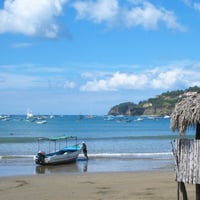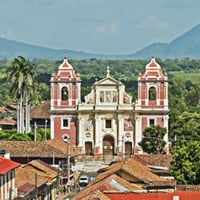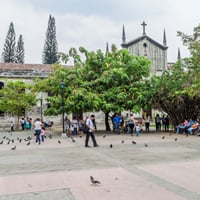Nicaragua
Coastal BeachesNicaragua, officially known as the Republic of Nicaragua, is the largest country in Central America, bordered by Honduras to the north, Costa Rica to the south, the Pacific Ocean to the west, and the Caribbean Sea to the east. The country's diverse geography includes lakes, volcanoes, and rainforests, fostering a rich biodiversity. Nicaragua's landscape is marked by two major regions: the Pacific lowlands, characterized by fertile valleys and plains, and the North-Central highlands, home to the country's coffee and tobacco production. The eastern region, known as the Mosquito Coast, is sparsely populated and has a tropical rainforest climate. The capital and largest city, Managua, lies on the southwestern shore of Lake Managua and is the country's political, cultural, and economic center. Nicaragua's population is a mix of indigenous peoples, Europeans, Africans, and Asians, creating a multicultural and multilingual society, with Spanish being the official language. Nicaragua's history is filled with periods of political unrest, dictatorship, and revolution, most notably the Sandinista revolution in the late 20th century. Despite its tumultuous past, the country has made strides toward political stability and economic growth. Tourism is a growing industry, with visitors drawn to its historical sites, such as the colonial cities of Granada and León, as well as its natural attractions, including the volcanic island of Ometepe and the Corn Islands in the Caribbean. The economy is primarily based on agriculture, with coffee, beef, and gold being significant exports. However, Nicaragua remains one of the least developed countries in the Americas, with a significant portion of its population living below the poverty line. Efforts to improve education, healthcare, and infrastructure are ongoing challenges for the Nicaraguan government. Despite these challenges, Nicaraguans are known for their warmth and hospitality, and the country's rich cultural heritage is expressed through its music, dance, and cuisine. Traditional dishes such as gallo pinto (a rice and beans mixture), nacatamales (Nicaraguan tamales), and vigorón (a cabbage salad with yucca and pork rinds) reflect the fusion of indigenous and Spanish influences. Nicaragua's political scene remains dynamic, with debates over governance, social policies, and relations with other nations. The country continues to navigate its path toward sustainable development, balancing economic growth with the preservation of its natural resources and cultural identity.















